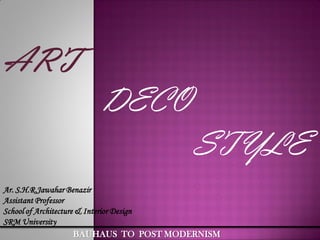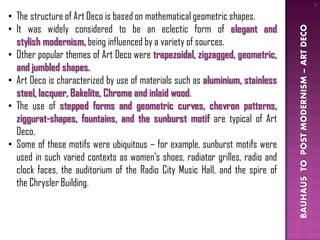Art deco style
- 1. DECO STYLE Ar. S.H.R.Jawahar Benazir Assistant Professor School of Architecture & Interior Design SRM University BAUHAUS TO POST MODERNISM
- 2. 2 • Art deco , or deco, is an eclectic artistic and design style that began in Paris in the 1920s and flourished internationally throughout the 1930s, into the BAUHAUS TO POST MODERNISM – ART DECO World War II era. • The style influenced all areas of design, including architecture and interior design, industrial design, fashion and jewelry, as well as the visual arts such as painting, graphic arts and film. • The term "art deco" was first used widely in 1926, after an exhibition in Paris, sub-titled Art Deco, celebrating the 1925 International Exhibition of Modern Decorative and Industrial Arts that was the culmination of style moderne in Paris. • At its best, art deco represented elegance, glamour, functionality and modernity. Art deco was purely decorative. • Art deco's linear symmetry was a distinct departure from the flowing asymmetrical organic curves of its predecessor style art nouveau; • It embraced influences from many different styles of the early twentieth century- including neoclassical, constructivism, cubism, modernism and futurism.
- 3. 3 • The structure of Art Deco is based on mathematical geometric shapes. • It was widely considered to be an eclectic form of elegant and BAUHAUS TO POST MODERNISM – ART DECO stylish modernism, being influenced by a variety of sources. • Other popular themes of Art Deco were trapezoidal, zigzagged, geometric, and jumbled shapes. • Art Deco is characterized by use of materials such as aluminium, stainless steel, lacquer, Bakelite, Chrome and inlaid wood. • The use of stepped forms and geometric curves, chevron patterns, ziggurat-shapes, fountains, and the sunburst motif are typical of Art Deco. • Some of these motifs were ubiquitous – for example, sunburst motifs were used in such varied contexts as women's shoes, radiator grilles, radio and clock faces, the auditorium of the Radio City Music Hall, and the spire of the Chrysler Building.
- 4. 4 BAUHAUS TO POST MODERNISM – ART DECO Art deco Motifs The art deco spire of the Chrysler Building , New York
- 5. 5 BAUHAUS TO POST MODERNISM – ART DECO Art Deco light fixture in the Urban Room at the top of Terracotta sunburst design above the William Penn Hotel the front doors of the Eastern Columbia Building, Los Angeles
- 6. Art Deco Interiors BAUHAUS TO POST MODERNISM – ART DECO 6
- 7. 7 BAUHAUS TO POST MODERNISM – ART DECO Art Deco Mirrored Bathtub Art Deco stained Glass Ceiling Pattern
- 8. 8 BAUHAUS TO POST MODERNISM – ART DECO Interior of Hoover Building - London
- 9. 9 AR T D E C O F U R N I T U R E • The characteristics of art deco furniture are sleek, BAUHAUS TO POST MODERNISM – ART DECO smooth, streamlined lines, geometrical patterns, and experimental use of industrial materials such as metals, plastics, and glass. Art deco furniture is modern and functional. • Art deco design is recognizable because of three main things: distinct geometric shapes, intense, bright colors that stand out, and a decorative look. • Art Deco is characterized by a linear, hard edge or angular composition, often with a vertical emphasis, and highlighted with stylized decoration". • Also, Art Deco, while being decorative, is very simple, in that it doesn't have any complicated shapes. • The Art Deco movement is also characterized by clean lines, streamlining, and symmetry. • Art Deco works exhibit abstraction, distortion, & simplification, particularly geometric shapes & highly intense colors.
- 10. 10 BAUHAUS TO POST MODERNISM – ART DECO Art Deco Dresser Art Deco Coffee Table Art Deco Leather Club Chairs Art Deco Chrome Plated Metal Lounge Chair
- 11. 11 BAUHAUS TO POST MODERNISM – ART DECO Art Deco Armchair - Ivory Art Deco Stool- Ebony and inlay and velvet-like stained maple, upholstered upholstery. in brocaded silk.
- 12. 12 BAUHAUS TO POST MODERNISM – ART DECO Art Deco Tub chair - with Art Deco Era chair wooden inlay Art Deco Sofa - Wood Inlay
- 13. 13 BAUHAUS TO POST MODERNISM – ART DECO Art Deco Mirrored Lucite & Chrome Dressing Table Makeup Table Art Deco Geometric Mirror
- 14. Lighting Art Deco BAUHAUS TO POST MODERNISM – ART DECO 14













